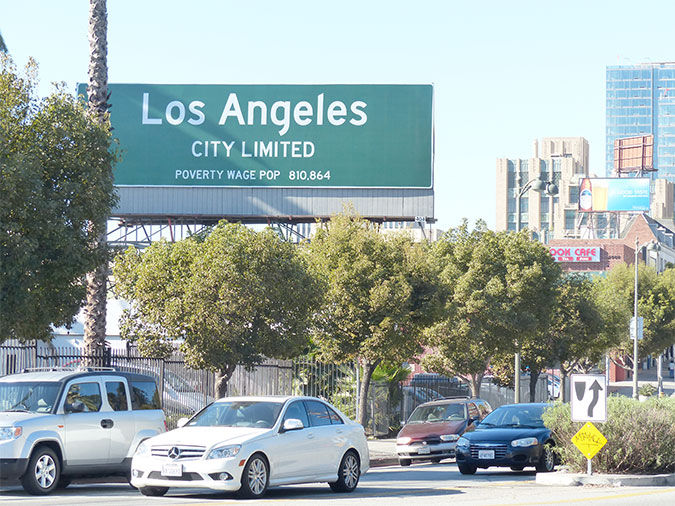Forty-six percent of working men and women — or nearly 811,000 individuals — struggle with “poverty wages” of less than $15 an hour in Los Angeles, according to a new report from the Economic Roundtable.
“L.A. is fast becoming a city of the haves and the have-nots,” declared Maria Elena Durazo, chief of the Los Angeles County Federation of Labor. “We are, unfortunately, one of the leading low-wage capitals of the country.”
At a news conference on a grassy knoll bordering MacArthur Park, the labor leader said the study, commissioned by her organization, showed raising the pay of these low-wage workers would not only greatly benefit them and their families, but also be a significant economic boost for the whole region.
“If every low-wage worker in L.A. made $15 an hour, it would raise enough city revenue to fill 10 million potholes, or hire 1,000 first responders, or keep every library open every day,” said Durazo.
Daniel Flaming, coauthor of Economic Roundtable report, said a $15 minimum wage would generate $9.2 billion in annual sales while creating 64,700 new jobs in Los Angeles. In addition, he noted, state and local revenue would climb by $555 million.
“The basic issue is whether workers should receive a share of the value they create through their work that is sufficiently large to support a basic standard of living,” states the 33-page “Effects of a Fifteen Dollar-an-Hour Minimum Wage in the City of Los Angeles.”
At the outdoor news conference, the labor federation also unveiled its new billboards that say: “Los Angeles, City Limited, Poverty Wage Pop. 810,864.” Designed to closely resemble green “city limits” signs, the seven billboards are located near downtown, Los Angeles International Airport and the Westside.
The report and billboard campaign are in conjunction with the county labor federation and Unite Here Local 11’s campaign to raise the hourly pay of hotel workers in Los Angeles to $15.37.
“We hope this study provokes a dialogue that leads us all to act in a way that makes this big number — 810,864 — smaller,” stressed Durazo, pointing to the green billboard looming above trees at Wilshire Boulevard and South Hoover Street.
She said unions, politicians, business leaders, entrepreneurs, educators and religious leaders must deal with the “massive problem of poverty wages” in Los Angeles. “And if you’re not moved on a moral basis, think of how much better a city we could have if everyone made a decent wage.”

